Analysis of Transformational Leadership in Nursing Practice
VerifiedAdded on 2023/06/03
|12
|3307
|91
Report
AI Summary
This report provides an in-depth analysis of the transformational leadership approach in nursing, emphasizing its role in modern healthcare. It details the key characteristics of transformational leadership, such as inspiring a shared vision, adaptability, and challenging the status quo. The report reflects on the impact of this leadership style on nurses, communication, professional relationships, conflict management, delegation of care, and scope of practice. It further discusses how transformational leadership contributes to quality healthcare by fostering autonomy, accountability, cooperation, and effective communication. The report concludes by highlighting the opportunities it offers for graduate nurses to develop leadership skills, emphasizing mentorship and involvement in decision-making processes. This student-contributed assignment is available on Desklib, a platform offering a wealth of study resources for students.
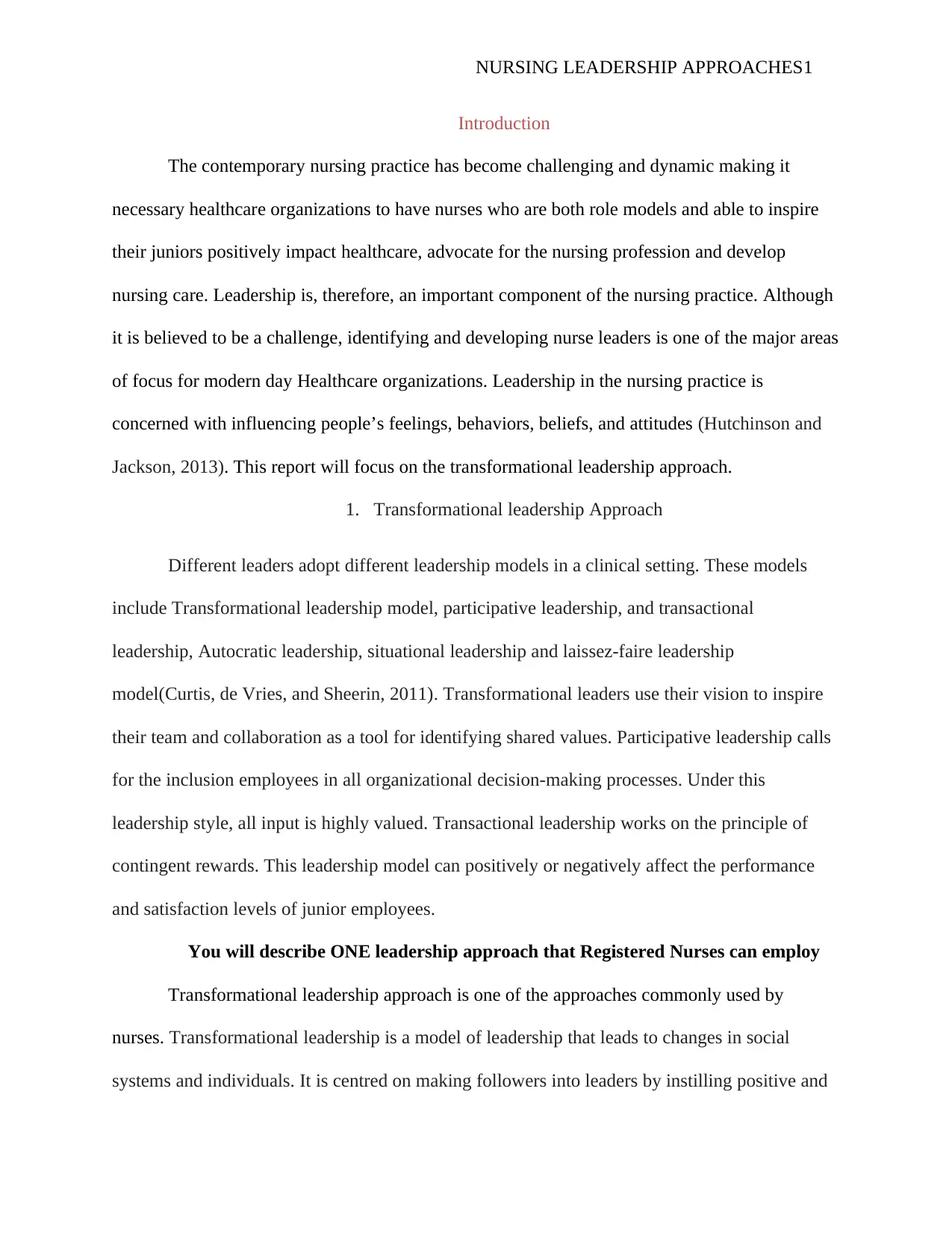
NURSING LEADERSHIP APPROACHES1
Introduction
The contemporary nursing practice has become challenging and dynamic making it
necessary healthcare organizations to have nurses who are both role models and able to inspire
their juniors positively impact healthcare, advocate for the nursing profession and develop
nursing care. Leadership is, therefore, an important component of the nursing practice. Although
it is believed to be a challenge, identifying and developing nurse leaders is one of the major areas
of focus for modern day Healthcare organizations. Leadership in the nursing practice is
concerned with influencing people’s feelings, behaviors, beliefs, and attitudes (Hutchinson and
Jackson, 2013). This report will focus on the transformational leadership approach.
1. Transformational leadership Approach
Different leaders adopt different leadership models in a clinical setting. These models
include Transformational leadership model, participative leadership, and transactional
leadership, Autocratic leadership, situational leadership and laissez-faire leadership
model(Curtis, de Vries, and Sheerin, 2011). Transformational leaders use their vision to inspire
their team and collaboration as a tool for identifying shared values. Participative leadership calls
for the inclusion employees in all organizational decision-making processes. Under this
leadership style, all input is highly valued. Transactional leadership works on the principle of
contingent rewards. This leadership model can positively or negatively affect the performance
and satisfaction levels of junior employees.
You will describe ONE leadership approach that Registered Nurses can employ
Transformational leadership approach is one of the approaches commonly used by
nurses. Transformational leadership is a model of leadership that leads to changes in social
systems and individuals. It is centred on making followers into leaders by instilling positive and
Introduction
The contemporary nursing practice has become challenging and dynamic making it
necessary healthcare organizations to have nurses who are both role models and able to inspire
their juniors positively impact healthcare, advocate for the nursing profession and develop
nursing care. Leadership is, therefore, an important component of the nursing practice. Although
it is believed to be a challenge, identifying and developing nurse leaders is one of the major areas
of focus for modern day Healthcare organizations. Leadership in the nursing practice is
concerned with influencing people’s feelings, behaviors, beliefs, and attitudes (Hutchinson and
Jackson, 2013). This report will focus on the transformational leadership approach.
1. Transformational leadership Approach
Different leaders adopt different leadership models in a clinical setting. These models
include Transformational leadership model, participative leadership, and transactional
leadership, Autocratic leadership, situational leadership and laissez-faire leadership
model(Curtis, de Vries, and Sheerin, 2011). Transformational leaders use their vision to inspire
their team and collaboration as a tool for identifying shared values. Participative leadership calls
for the inclusion employees in all organizational decision-making processes. Under this
leadership style, all input is highly valued. Transactional leadership works on the principle of
contingent rewards. This leadership model can positively or negatively affect the performance
and satisfaction levels of junior employees.
You will describe ONE leadership approach that Registered Nurses can employ
Transformational leadership approach is one of the approaches commonly used by
nurses. Transformational leadership is a model of leadership that leads to changes in social
systems and individuals. It is centred on making followers into leaders by instilling positive and
Paraphrase This Document
Need a fresh take? Get an instant paraphrase of this document with our AI Paraphraser
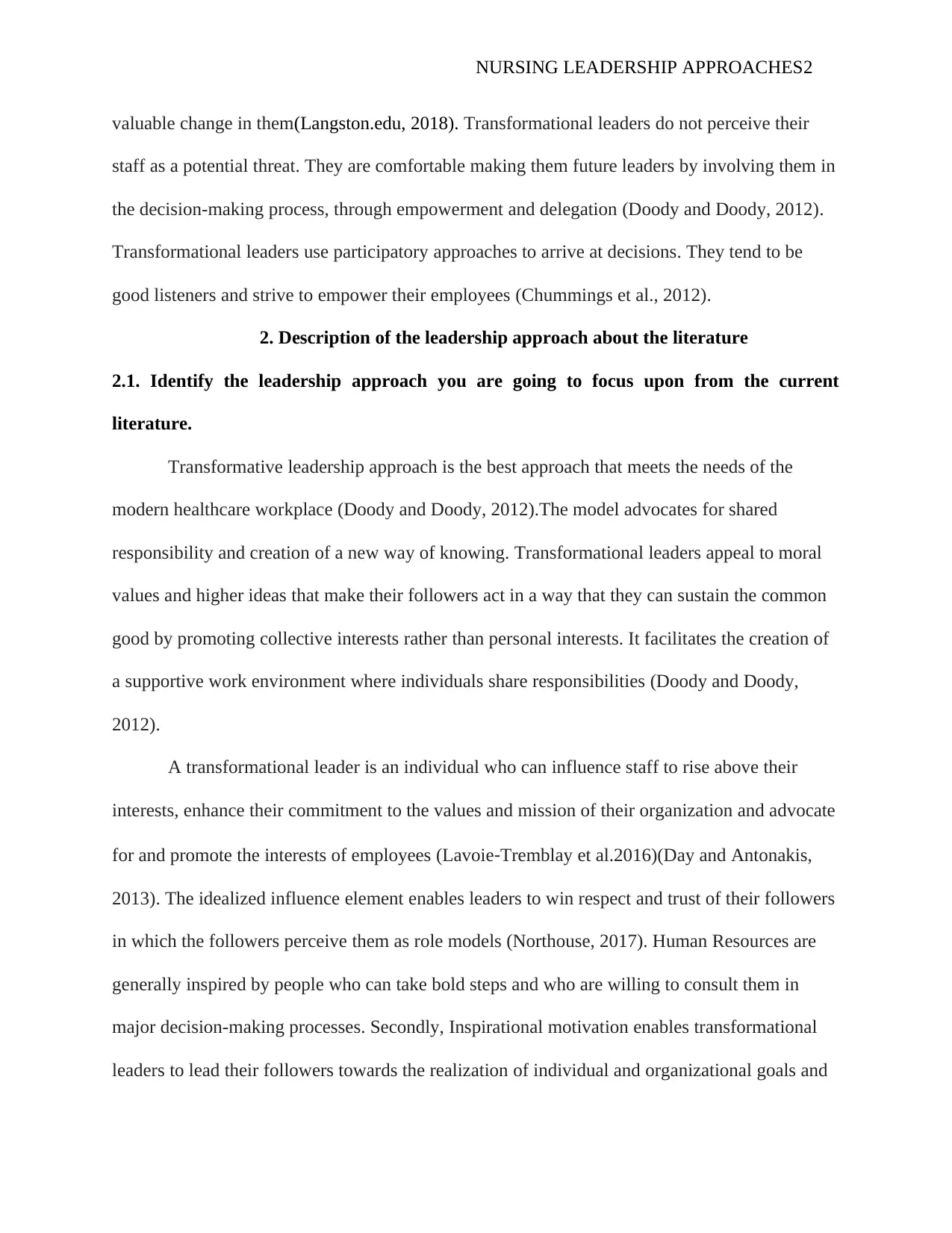
NURSING LEADERSHIP APPROACHES2
valuable change in them(Langston.edu, 2018). Transformational leaders do not perceive their
staff as a potential threat. They are comfortable making them future leaders by involving them in
the decision-making process, through empowerment and delegation (Doody and Doody, 2012).
Transformational leaders use participatory approaches to arrive at decisions. They tend to be
good listeners and strive to empower their employees (Chummings et al., 2012).
2. Description of the leadership approach about the literature
2.1. Identify the leadership approach you are going to focus upon from the current
literature.
Transformative leadership approach is the best approach that meets the needs of the
modern healthcare workplace (Doody and Doody, 2012).The model advocates for shared
responsibility and creation of a new way of knowing. Transformational leaders appeal to moral
values and higher ideas that make their followers act in a way that they can sustain the common
good by promoting collective interests rather than personal interests. It facilitates the creation of
a supportive work environment where individuals share responsibilities (Doody and Doody,
2012).
A transformational leader is an individual who can influence staff to rise above their
interests, enhance their commitment to the values and mission of their organization and advocate
for and promote the interests of employees (Lavoie‐Tremblay et al.2016)(Day and Antonakis,
2013). The idealized influence element enables leaders to win respect and trust of their followers
in which the followers perceive them as role models (Northouse, 2017). Human Resources are
generally inspired by people who can take bold steps and who are willing to consult them in
major decision-making processes. Secondly, Inspirational motivation enables transformational
leaders to lead their followers towards the realization of individual and organizational goals and
valuable change in them(Langston.edu, 2018). Transformational leaders do not perceive their
staff as a potential threat. They are comfortable making them future leaders by involving them in
the decision-making process, through empowerment and delegation (Doody and Doody, 2012).
Transformational leaders use participatory approaches to arrive at decisions. They tend to be
good listeners and strive to empower their employees (Chummings et al., 2012).
2. Description of the leadership approach about the literature
2.1. Identify the leadership approach you are going to focus upon from the current
literature.
Transformative leadership approach is the best approach that meets the needs of the
modern healthcare workplace (Doody and Doody, 2012).The model advocates for shared
responsibility and creation of a new way of knowing. Transformational leaders appeal to moral
values and higher ideas that make their followers act in a way that they can sustain the common
good by promoting collective interests rather than personal interests. It facilitates the creation of
a supportive work environment where individuals share responsibilities (Doody and Doody,
2012).
A transformational leader is an individual who can influence staff to rise above their
interests, enhance their commitment to the values and mission of their organization and advocate
for and promote the interests of employees (Lavoie‐Tremblay et al.2016)(Day and Antonakis,
2013). The idealized influence element enables leaders to win respect and trust of their followers
in which the followers perceive them as role models (Northouse, 2017). Human Resources are
generally inspired by people who can take bold steps and who are willing to consult them in
major decision-making processes. Secondly, Inspirational motivation enables transformational
leaders to lead their followers towards the realization of individual and organizational goals and
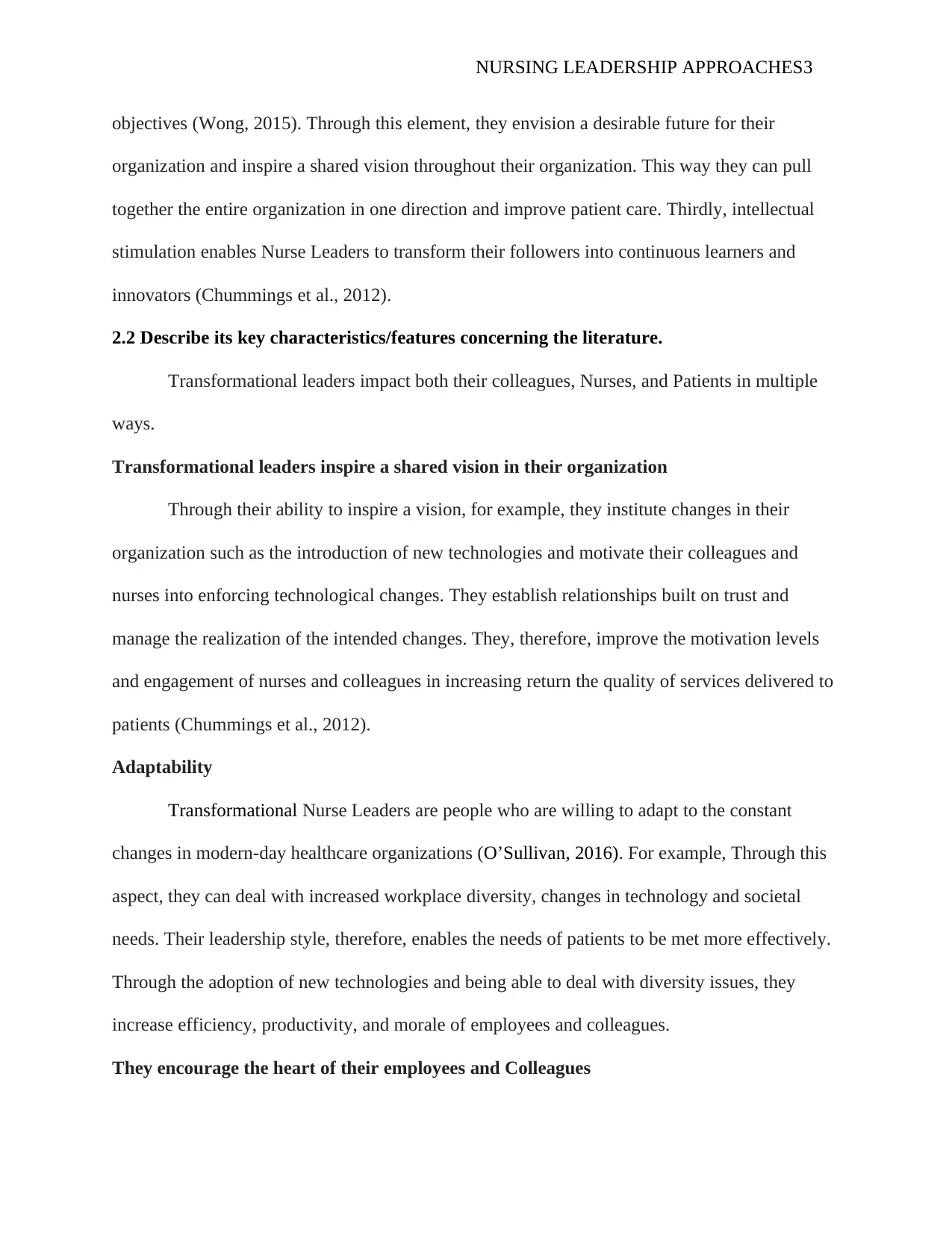
NURSING LEADERSHIP APPROACHES3
objectives (Wong, 2015). Through this element, they envision a desirable future for their
organization and inspire a shared vision throughout their organization. This way they can pull
together the entire organization in one direction and improve patient care. Thirdly, intellectual
stimulation enables Nurse Leaders to transform their followers into continuous learners and
innovators (Chummings et al., 2012).
2.2 Describe its key characteristics/features concerning the literature.
Transformational leaders impact both their colleagues, Nurses, and Patients in multiple
ways.
Transformational leaders inspire a shared vision in their organization
Through their ability to inspire a vision, for example, they institute changes in their
organization such as the introduction of new technologies and motivate their colleagues and
nurses into enforcing technological changes. They establish relationships built on trust and
manage the realization of the intended changes. They, therefore, improve the motivation levels
and engagement of nurses and colleagues in increasing return the quality of services delivered to
patients (Chummings et al., 2012).
Adaptability
Transformational Nurse Leaders are people who are willing to adapt to the constant
changes in modern-day healthcare organizations (O’Sullivan, 2016). For example, Through this
aspect, they can deal with increased workplace diversity, changes in technology and societal
needs. Their leadership style, therefore, enables the needs of patients to be met more effectively.
Through the adoption of new technologies and being able to deal with diversity issues, they
increase efficiency, productivity, and morale of employees and colleagues.
They encourage the heart of their employees and Colleagues
objectives (Wong, 2015). Through this element, they envision a desirable future for their
organization and inspire a shared vision throughout their organization. This way they can pull
together the entire organization in one direction and improve patient care. Thirdly, intellectual
stimulation enables Nurse Leaders to transform their followers into continuous learners and
innovators (Chummings et al., 2012).
2.2 Describe its key characteristics/features concerning the literature.
Transformational leaders impact both their colleagues, Nurses, and Patients in multiple
ways.
Transformational leaders inspire a shared vision in their organization
Through their ability to inspire a vision, for example, they institute changes in their
organization such as the introduction of new technologies and motivate their colleagues and
nurses into enforcing technological changes. They establish relationships built on trust and
manage the realization of the intended changes. They, therefore, improve the motivation levels
and engagement of nurses and colleagues in increasing return the quality of services delivered to
patients (Chummings et al., 2012).
Adaptability
Transformational Nurse Leaders are people who are willing to adapt to the constant
changes in modern-day healthcare organizations (O’Sullivan, 2016). For example, Through this
aspect, they can deal with increased workplace diversity, changes in technology and societal
needs. Their leadership style, therefore, enables the needs of patients to be met more effectively.
Through the adoption of new technologies and being able to deal with diversity issues, they
increase efficiency, productivity, and morale of employees and colleagues.
They encourage the heart of their employees and Colleagues
⊘ This is a preview!⊘
Do you want full access?
Subscribe today to unlock all pages.

Trusted by 1+ million students worldwide
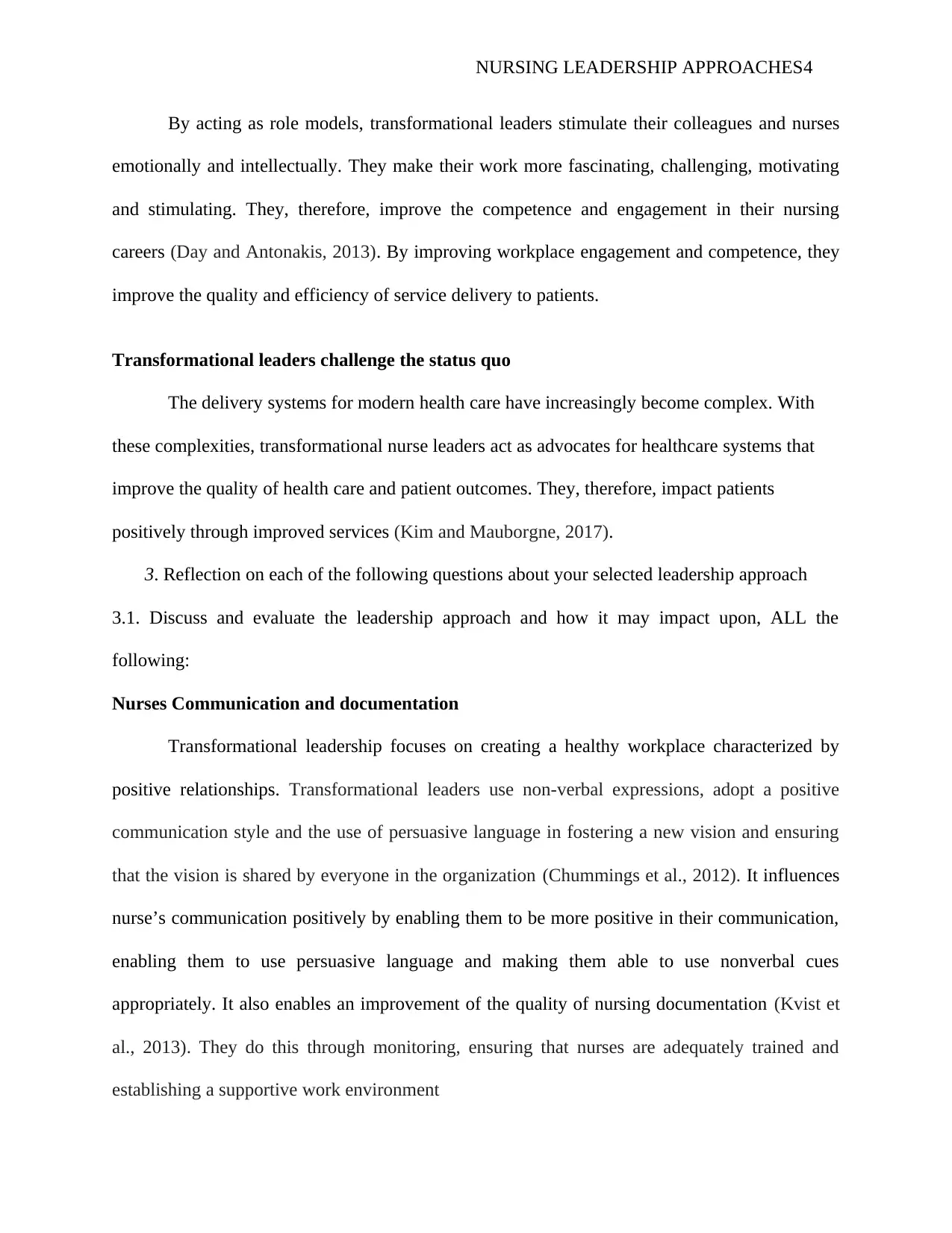
NURSING LEADERSHIP APPROACHES4
By acting as role models, transformational leaders stimulate their colleagues and nurses
emotionally and intellectually. They make their work more fascinating, challenging, motivating
and stimulating. They, therefore, improve the competence and engagement in their nursing
careers (Day and Antonakis, 2013). By improving workplace engagement and competence, they
improve the quality and efficiency of service delivery to patients.
Transformational leaders challenge the status quo
The delivery systems for modern health care have increasingly become complex. With
these complexities, transformational nurse leaders act as advocates for healthcare systems that
improve the quality of health care and patient outcomes. They, therefore, impact patients
positively through improved services (Kim and Mauborgne, 2017).
3. Reflection on each of the following questions about your selected leadership approach
3.1. Discuss and evaluate the leadership approach and how it may impact upon, ALL the
following:
Nurses Communication and documentation
Transformational leadership focuses on creating a healthy workplace characterized by
positive relationships. Transformational leaders use non-verbal expressions, adopt a positive
communication style and the use of persuasive language in fostering a new vision and ensuring
that the vision is shared by everyone in the organization (Chummings et al., 2012). It influences
nurse’s communication positively by enabling them to be more positive in their communication,
enabling them to use persuasive language and making them able to use nonverbal cues
appropriately. It also enables an improvement of the quality of nursing documentation (Kvist et
al., 2013). They do this through monitoring, ensuring that nurses are adequately trained and
establishing a supportive work environment
By acting as role models, transformational leaders stimulate their colleagues and nurses
emotionally and intellectually. They make their work more fascinating, challenging, motivating
and stimulating. They, therefore, improve the competence and engagement in their nursing
careers (Day and Antonakis, 2013). By improving workplace engagement and competence, they
improve the quality and efficiency of service delivery to patients.
Transformational leaders challenge the status quo
The delivery systems for modern health care have increasingly become complex. With
these complexities, transformational nurse leaders act as advocates for healthcare systems that
improve the quality of health care and patient outcomes. They, therefore, impact patients
positively through improved services (Kim and Mauborgne, 2017).
3. Reflection on each of the following questions about your selected leadership approach
3.1. Discuss and evaluate the leadership approach and how it may impact upon, ALL the
following:
Nurses Communication and documentation
Transformational leadership focuses on creating a healthy workplace characterized by
positive relationships. Transformational leaders use non-verbal expressions, adopt a positive
communication style and the use of persuasive language in fostering a new vision and ensuring
that the vision is shared by everyone in the organization (Chummings et al., 2012). It influences
nurse’s communication positively by enabling them to be more positive in their communication,
enabling them to use persuasive language and making them able to use nonverbal cues
appropriately. It also enables an improvement of the quality of nursing documentation (Kvist et
al., 2013). They do this through monitoring, ensuring that nurses are adequately trained and
establishing a supportive work environment
Paraphrase This Document
Need a fresh take? Get an instant paraphrase of this document with our AI Paraphraser
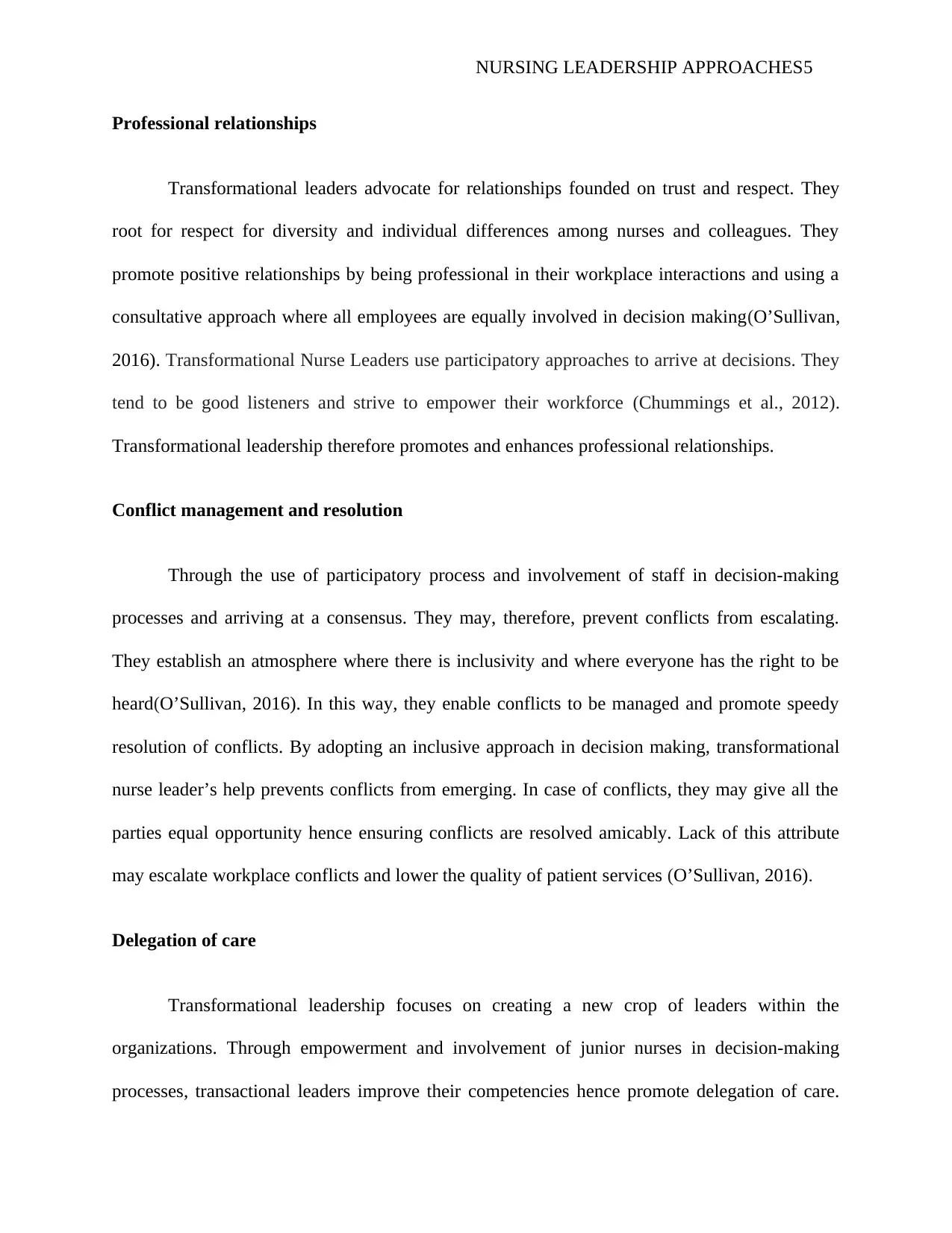
NURSING LEADERSHIP APPROACHES5
Professional relationships
Transformational leaders advocate for relationships founded on trust and respect. They
root for respect for diversity and individual differences among nurses and colleagues. They
promote positive relationships by being professional in their workplace interactions and using a
consultative approach where all employees are equally involved in decision making(O’Sullivan,
2016). Transformational Nurse Leaders use participatory approaches to arrive at decisions. They
tend to be good listeners and strive to empower their workforce (Chummings et al., 2012).
Transformational leadership therefore promotes and enhances professional relationships.
Conflict management and resolution
Through the use of participatory process and involvement of staff in decision-making
processes and arriving at a consensus. They may, therefore, prevent conflicts from escalating.
They establish an atmosphere where there is inclusivity and where everyone has the right to be
heard(O’Sullivan, 2016). In this way, they enable conflicts to be managed and promote speedy
resolution of conflicts. By adopting an inclusive approach in decision making, transformational
nurse leader’s help prevents conflicts from emerging. In case of conflicts, they may give all the
parties equal opportunity hence ensuring conflicts are resolved amicably. Lack of this attribute
may escalate workplace conflicts and lower the quality of patient services (O’Sullivan, 2016).
Delegation of care
Transformational leadership focuses on creating a new crop of leaders within the
organizations. Through empowerment and involvement of junior nurses in decision-making
processes, transactional leaders improve their competencies hence promote delegation of care.
Professional relationships
Transformational leaders advocate for relationships founded on trust and respect. They
root for respect for diversity and individual differences among nurses and colleagues. They
promote positive relationships by being professional in their workplace interactions and using a
consultative approach where all employees are equally involved in decision making(O’Sullivan,
2016). Transformational Nurse Leaders use participatory approaches to arrive at decisions. They
tend to be good listeners and strive to empower their workforce (Chummings et al., 2012).
Transformational leadership therefore promotes and enhances professional relationships.
Conflict management and resolution
Through the use of participatory process and involvement of staff in decision-making
processes and arriving at a consensus. They may, therefore, prevent conflicts from escalating.
They establish an atmosphere where there is inclusivity and where everyone has the right to be
heard(O’Sullivan, 2016). In this way, they enable conflicts to be managed and promote speedy
resolution of conflicts. By adopting an inclusive approach in decision making, transformational
nurse leader’s help prevents conflicts from emerging. In case of conflicts, they may give all the
parties equal opportunity hence ensuring conflicts are resolved amicably. Lack of this attribute
may escalate workplace conflicts and lower the quality of patient services (O’Sullivan, 2016).
Delegation of care
Transformational leadership focuses on creating a new crop of leaders within the
organizations. Through empowerment and involvement of junior nurses in decision-making
processes, transactional leaders improve their competencies hence promote delegation of care.
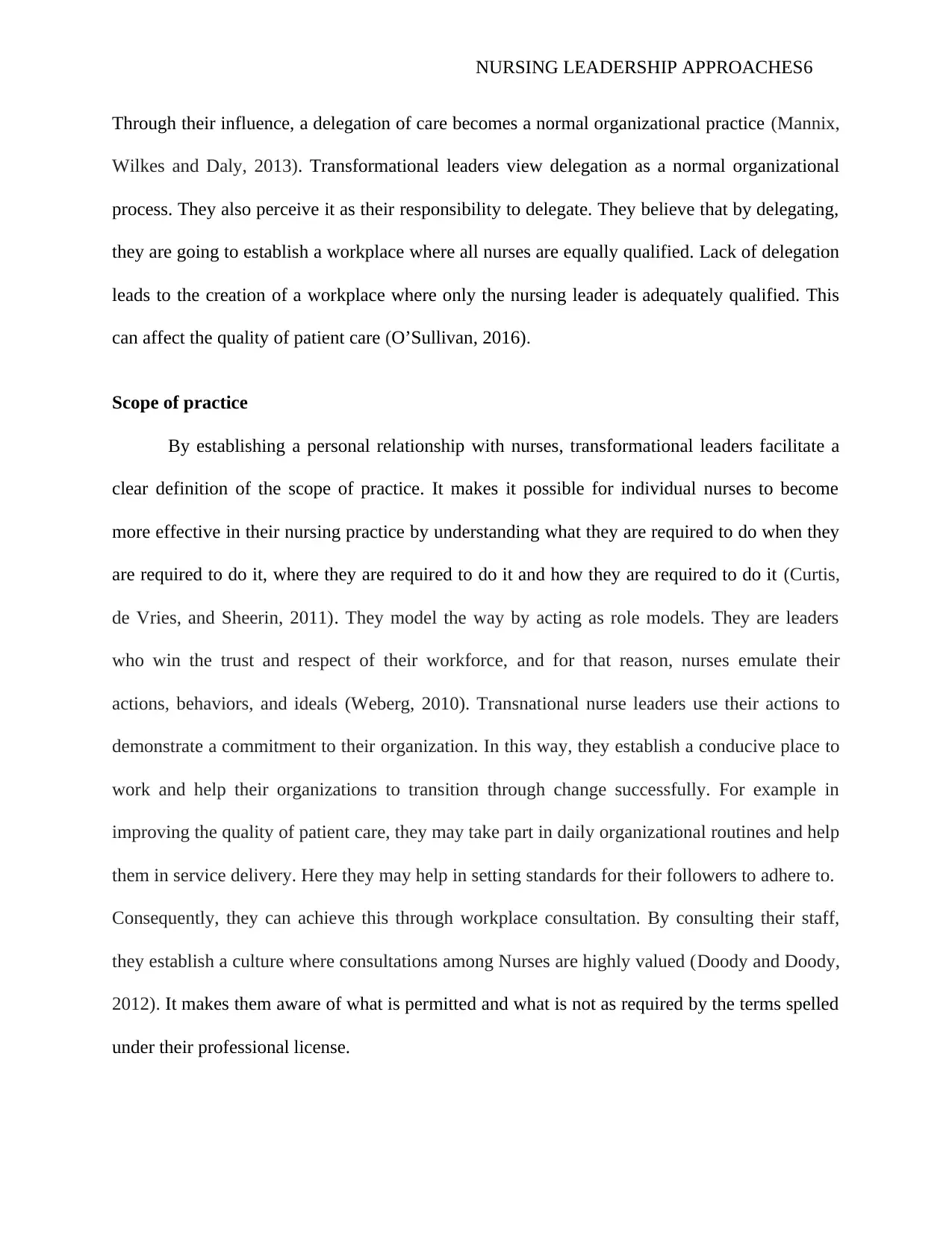
NURSING LEADERSHIP APPROACHES6
Through their influence, a delegation of care becomes a normal organizational practice (Mannix,
Wilkes and Daly, 2013). Transformational leaders view delegation as a normal organizational
process. They also perceive it as their responsibility to delegate. They believe that by delegating,
they are going to establish a workplace where all nurses are equally qualified. Lack of delegation
leads to the creation of a workplace where only the nursing leader is adequately qualified. This
can affect the quality of patient care (O’Sullivan, 2016).
Scope of practice
By establishing a personal relationship with nurses, transformational leaders facilitate a
clear definition of the scope of practice. It makes it possible for individual nurses to become
more effective in their nursing practice by understanding what they are required to do when they
are required to do it, where they are required to do it and how they are required to do it (Curtis,
de Vries, and Sheerin, 2011). They model the way by acting as role models. They are leaders
who win the trust and respect of their workforce, and for that reason, nurses emulate their
actions, behaviors, and ideals (Weberg, 2010). Transnational nurse leaders use their actions to
demonstrate a commitment to their organization. In this way, they establish a conducive place to
work and help their organizations to transition through change successfully. For example in
improving the quality of patient care, they may take part in daily organizational routines and help
them in service delivery. Here they may help in setting standards for their followers to adhere to.
Consequently, they can achieve this through workplace consultation. By consulting their staff,
they establish a culture where consultations among Nurses are highly valued (Doody and Doody,
2012). It makes them aware of what is permitted and what is not as required by the terms spelled
under their professional license.
Through their influence, a delegation of care becomes a normal organizational practice (Mannix,
Wilkes and Daly, 2013). Transformational leaders view delegation as a normal organizational
process. They also perceive it as their responsibility to delegate. They believe that by delegating,
they are going to establish a workplace where all nurses are equally qualified. Lack of delegation
leads to the creation of a workplace where only the nursing leader is adequately qualified. This
can affect the quality of patient care (O’Sullivan, 2016).
Scope of practice
By establishing a personal relationship with nurses, transformational leaders facilitate a
clear definition of the scope of practice. It makes it possible for individual nurses to become
more effective in their nursing practice by understanding what they are required to do when they
are required to do it, where they are required to do it and how they are required to do it (Curtis,
de Vries, and Sheerin, 2011). They model the way by acting as role models. They are leaders
who win the trust and respect of their workforce, and for that reason, nurses emulate their
actions, behaviors, and ideals (Weberg, 2010). Transnational nurse leaders use their actions to
demonstrate a commitment to their organization. In this way, they establish a conducive place to
work and help their organizations to transition through change successfully. For example in
improving the quality of patient care, they may take part in daily organizational routines and help
them in service delivery. Here they may help in setting standards for their followers to adhere to.
Consequently, they can achieve this through workplace consultation. By consulting their staff,
they establish a culture where consultations among Nurses are highly valued (Doody and Doody,
2012). It makes them aware of what is permitted and what is not as required by the terms spelled
under their professional license.
⊘ This is a preview!⊘
Do you want full access?
Subscribe today to unlock all pages.

Trusted by 1+ million students worldwide
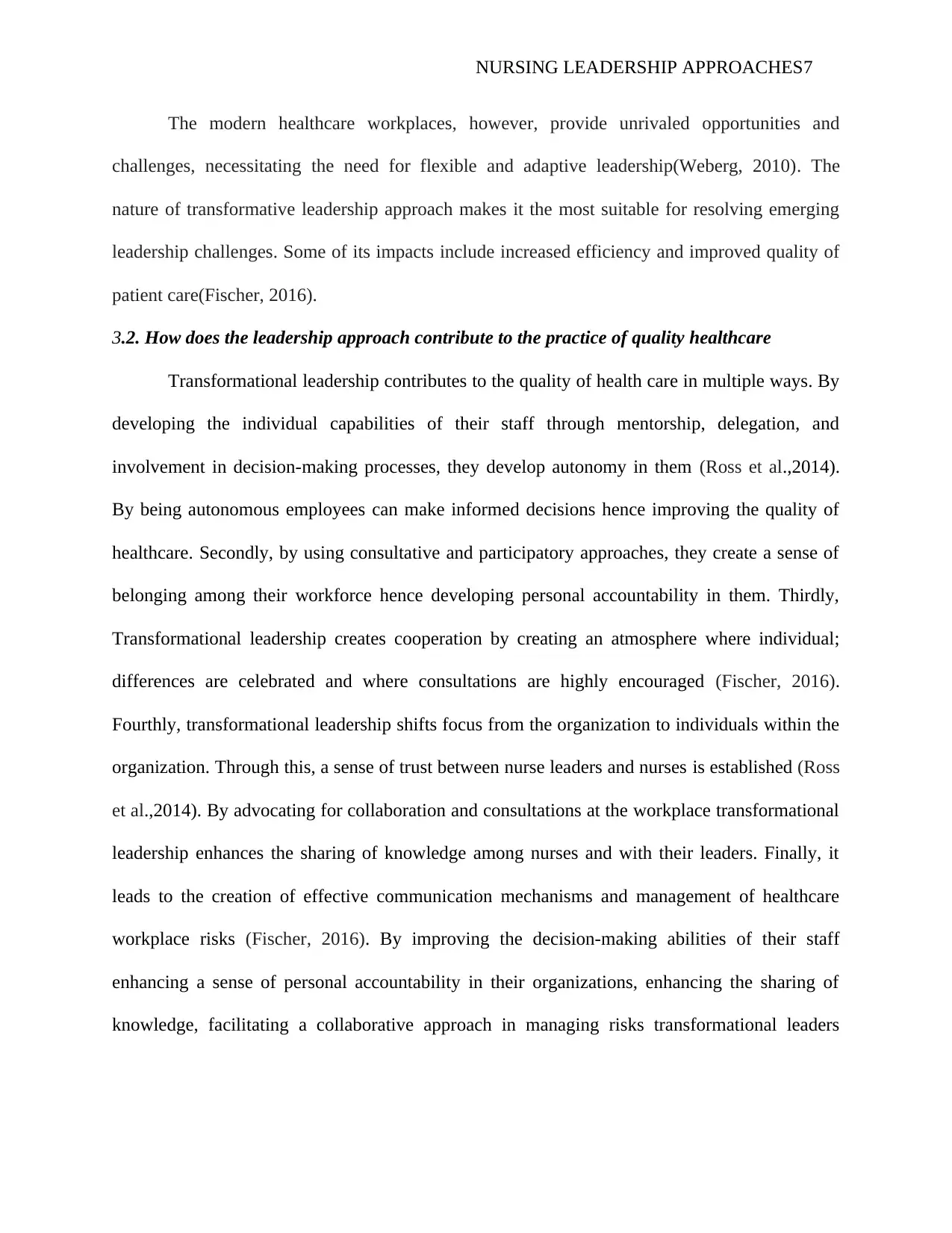
NURSING LEADERSHIP APPROACHES7
The modern healthcare workplaces, however, provide unrivaled opportunities and
challenges, necessitating the need for flexible and adaptive leadership(Weberg, 2010). The
nature of transformative leadership approach makes it the most suitable for resolving emerging
leadership challenges. Some of its impacts include increased efficiency and improved quality of
patient care(Fischer, 2016).
3.2. How does the leadership approach contribute to the practice of quality healthcare
Transformational leadership contributes to the quality of health care in multiple ways. By
developing the individual capabilities of their staff through mentorship, delegation, and
involvement in decision-making processes, they develop autonomy in them (Ross et al.,2014).
By being autonomous employees can make informed decisions hence improving the quality of
healthcare. Secondly, by using consultative and participatory approaches, they create a sense of
belonging among their workforce hence developing personal accountability in them. Thirdly,
Transformational leadership creates cooperation by creating an atmosphere where individual;
differences are celebrated and where consultations are highly encouraged (Fischer, 2016).
Fourthly, transformational leadership shifts focus from the organization to individuals within the
organization. Through this, a sense of trust between nurse leaders and nurses is established (Ross
et al.,2014). By advocating for collaboration and consultations at the workplace transformational
leadership enhances the sharing of knowledge among nurses and with their leaders. Finally, it
leads to the creation of effective communication mechanisms and management of healthcare
workplace risks (Fischer, 2016). By improving the decision-making abilities of their staff
enhancing a sense of personal accountability in their organizations, enhancing the sharing of
knowledge, facilitating a collaborative approach in managing risks transformational leaders
The modern healthcare workplaces, however, provide unrivaled opportunities and
challenges, necessitating the need for flexible and adaptive leadership(Weberg, 2010). The
nature of transformative leadership approach makes it the most suitable for resolving emerging
leadership challenges. Some of its impacts include increased efficiency and improved quality of
patient care(Fischer, 2016).
3.2. How does the leadership approach contribute to the practice of quality healthcare
Transformational leadership contributes to the quality of health care in multiple ways. By
developing the individual capabilities of their staff through mentorship, delegation, and
involvement in decision-making processes, they develop autonomy in them (Ross et al.,2014).
By being autonomous employees can make informed decisions hence improving the quality of
healthcare. Secondly, by using consultative and participatory approaches, they create a sense of
belonging among their workforce hence developing personal accountability in them. Thirdly,
Transformational leadership creates cooperation by creating an atmosphere where individual;
differences are celebrated and where consultations are highly encouraged (Fischer, 2016).
Fourthly, transformational leadership shifts focus from the organization to individuals within the
organization. Through this, a sense of trust between nurse leaders and nurses is established (Ross
et al.,2014). By advocating for collaboration and consultations at the workplace transformational
leadership enhances the sharing of knowledge among nurses and with their leaders. Finally, it
leads to the creation of effective communication mechanisms and management of healthcare
workplace risks (Fischer, 2016). By improving the decision-making abilities of their staff
enhancing a sense of personal accountability in their organizations, enhancing the sharing of
knowledge, facilitating a collaborative approach in managing risks transformational leaders
Paraphrase This Document
Need a fresh take? Get an instant paraphrase of this document with our AI Paraphraser
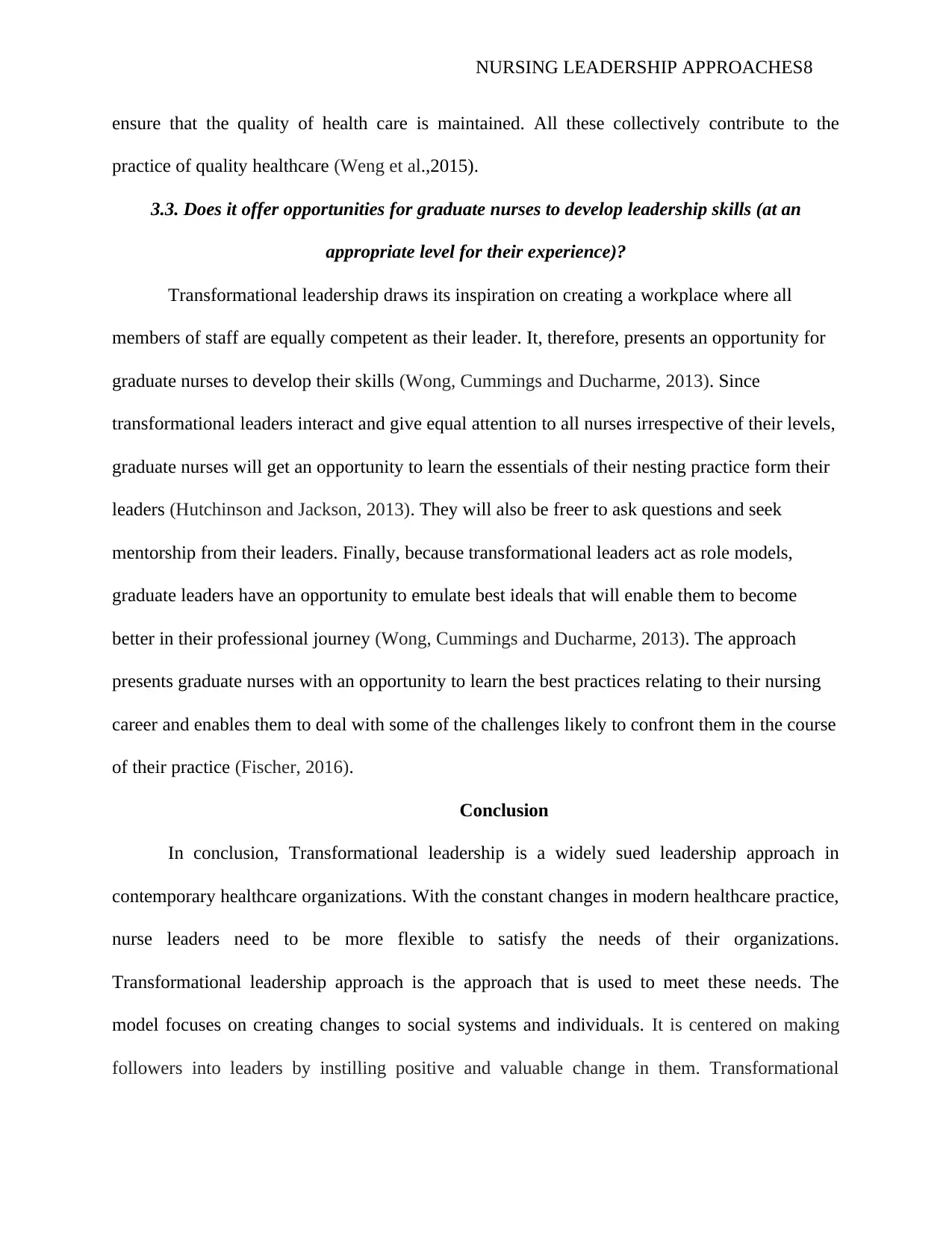
NURSING LEADERSHIP APPROACHES8
ensure that the quality of health care is maintained. All these collectively contribute to the
practice of quality healthcare (Weng et al.,2015).
3.3. Does it offer opportunities for graduate nurses to develop leadership skills (at an
appropriate level for their experience)?
Transformational leadership draws its inspiration on creating a workplace where all
members of staff are equally competent as their leader. It, therefore, presents an opportunity for
graduate nurses to develop their skills (Wong, Cummings and Ducharme, 2013). Since
transformational leaders interact and give equal attention to all nurses irrespective of their levels,
graduate nurses will get an opportunity to learn the essentials of their nesting practice form their
leaders (Hutchinson and Jackson, 2013). They will also be freer to ask questions and seek
mentorship from their leaders. Finally, because transformational leaders act as role models,
graduate leaders have an opportunity to emulate best ideals that will enable them to become
better in their professional journey (Wong, Cummings and Ducharme, 2013). The approach
presents graduate nurses with an opportunity to learn the best practices relating to their nursing
career and enables them to deal with some of the challenges likely to confront them in the course
of their practice (Fischer, 2016).
Conclusion
In conclusion, Transformational leadership is a widely sued leadership approach in
contemporary healthcare organizations. With the constant changes in modern healthcare practice,
nurse leaders need to be more flexible to satisfy the needs of their organizations.
Transformational leadership approach is the approach that is used to meet these needs. The
model focuses on creating changes to social systems and individuals. It is centered on making
followers into leaders by instilling positive and valuable change in them. Transformational
ensure that the quality of health care is maintained. All these collectively contribute to the
practice of quality healthcare (Weng et al.,2015).
3.3. Does it offer opportunities for graduate nurses to develop leadership skills (at an
appropriate level for their experience)?
Transformational leadership draws its inspiration on creating a workplace where all
members of staff are equally competent as their leader. It, therefore, presents an opportunity for
graduate nurses to develop their skills (Wong, Cummings and Ducharme, 2013). Since
transformational leaders interact and give equal attention to all nurses irrespective of their levels,
graduate nurses will get an opportunity to learn the essentials of their nesting practice form their
leaders (Hutchinson and Jackson, 2013). They will also be freer to ask questions and seek
mentorship from their leaders. Finally, because transformational leaders act as role models,
graduate leaders have an opportunity to emulate best ideals that will enable them to become
better in their professional journey (Wong, Cummings and Ducharme, 2013). The approach
presents graduate nurses with an opportunity to learn the best practices relating to their nursing
career and enables them to deal with some of the challenges likely to confront them in the course
of their practice (Fischer, 2016).
Conclusion
In conclusion, Transformational leadership is a widely sued leadership approach in
contemporary healthcare organizations. With the constant changes in modern healthcare practice,
nurse leaders need to be more flexible to satisfy the needs of their organizations.
Transformational leadership approach is the approach that is used to meet these needs. The
model focuses on creating changes to social systems and individuals. It is centered on making
followers into leaders by instilling positive and valuable change in them. Transformational

NURSING LEADERSHIP APPROACHES9
leaders possess certain attributes that differentiate them from other leaders. Transformational
leadership impacts the quality of healthcare in multiple ways such as creating autonomy among
Nurses.
leaders possess certain attributes that differentiate them from other leaders. Transformational
leadership impacts the quality of healthcare in multiple ways such as creating autonomy among
Nurses.
⊘ This is a preview!⊘
Do you want full access?
Subscribe today to unlock all pages.

Trusted by 1+ million students worldwide
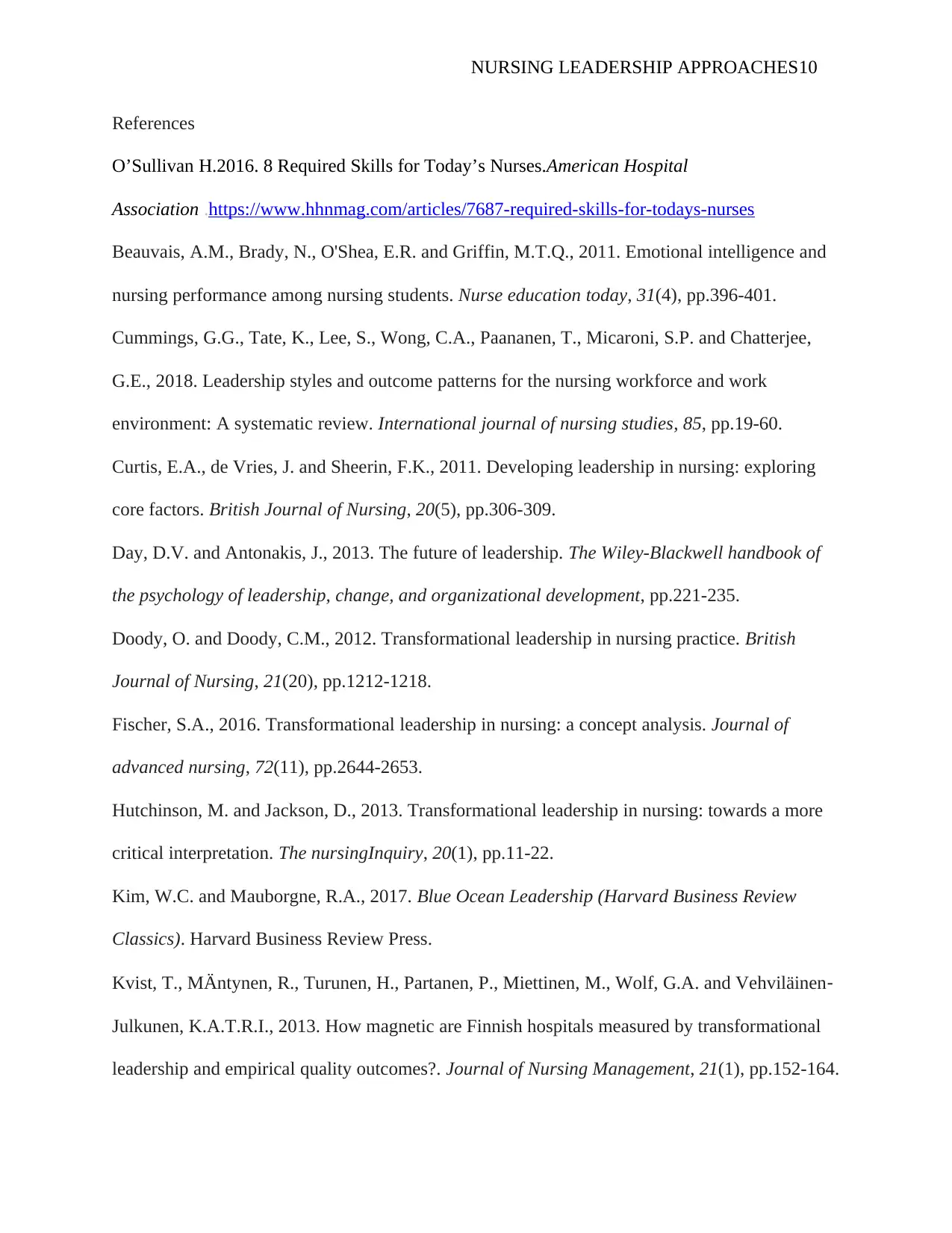
NURSING LEADERSHIP APPROACHES10
References
O’Sullivan H.2016. 8 Required Skills for Today’s Nurses.American Hospital
Association .https://www.hhnmag.com/articles/7687-required-skills-for-todays-nurses
Beauvais, A.M., Brady, N., O'Shea, E.R. and Griffin, M.T.Q., 2011. Emotional intelligence and
nursing performance among nursing students. Nurse education today, 31(4), pp.396-401.
Cummings, G.G., Tate, K., Lee, S., Wong, C.A., Paananen, T., Micaroni, S.P. and Chatterjee,
G.E., 2018. Leadership styles and outcome patterns for the nursing workforce and work
environment: A systematic review. International journal of nursing studies, 85, pp.19-60.
Curtis, E.A., de Vries, J. and Sheerin, F.K., 2011. Developing leadership in nursing: exploring
core factors. British Journal of Nursing, 20(5), pp.306-309.
Day, D.V. and Antonakis, J., 2013. The future of leadership. The Wiley-Blackwell handbook of
the psychology of leadership, change, and organizational development, pp.221-235.
Doody, O. and Doody, C.M., 2012. Transformational leadership in nursing practice. British
Journal of Nursing, 21(20), pp.1212-1218.
Fischer, S.A., 2016. Transformational leadership in nursing: a concept analysis. Journal of
advanced nursing, 72(11), pp.2644-2653.
Hutchinson, M. and Jackson, D., 2013. Transformational leadership in nursing: towards a more
critical interpretation. The nursingInquiry, 20(1), pp.11-22.
Kim, W.C. and Mauborgne, R.A., 2017. Blue Ocean Leadership (Harvard Business Review
Classics). Harvard Business Review Press.
Kvist, T., MÄntynen, R., Turunen, H., Partanen, P., Miettinen, M., Wolf, G.A. and Vehviläinen‐
Julkunen, K.A.T.R.I., 2013. How magnetic are Finnish hospitals measured by transformational
leadership and empirical quality outcomes?. Journal of Nursing Management, 21(1), pp.152-164.
References
O’Sullivan H.2016. 8 Required Skills for Today’s Nurses.American Hospital
Association .https://www.hhnmag.com/articles/7687-required-skills-for-todays-nurses
Beauvais, A.M., Brady, N., O'Shea, E.R. and Griffin, M.T.Q., 2011. Emotional intelligence and
nursing performance among nursing students. Nurse education today, 31(4), pp.396-401.
Cummings, G.G., Tate, K., Lee, S., Wong, C.A., Paananen, T., Micaroni, S.P. and Chatterjee,
G.E., 2018. Leadership styles and outcome patterns for the nursing workforce and work
environment: A systematic review. International journal of nursing studies, 85, pp.19-60.
Curtis, E.A., de Vries, J. and Sheerin, F.K., 2011. Developing leadership in nursing: exploring
core factors. British Journal of Nursing, 20(5), pp.306-309.
Day, D.V. and Antonakis, J., 2013. The future of leadership. The Wiley-Blackwell handbook of
the psychology of leadership, change, and organizational development, pp.221-235.
Doody, O. and Doody, C.M., 2012. Transformational leadership in nursing practice. British
Journal of Nursing, 21(20), pp.1212-1218.
Fischer, S.A., 2016. Transformational leadership in nursing: a concept analysis. Journal of
advanced nursing, 72(11), pp.2644-2653.
Hutchinson, M. and Jackson, D., 2013. Transformational leadership in nursing: towards a more
critical interpretation. The nursingInquiry, 20(1), pp.11-22.
Kim, W.C. and Mauborgne, R.A., 2017. Blue Ocean Leadership (Harvard Business Review
Classics). Harvard Business Review Press.
Kvist, T., MÄntynen, R., Turunen, H., Partanen, P., Miettinen, M., Wolf, G.A. and Vehviläinen‐
Julkunen, K.A.T.R.I., 2013. How magnetic are Finnish hospitals measured by transformational
leadership and empirical quality outcomes?. Journal of Nursing Management, 21(1), pp.152-164.
Paraphrase This Document
Need a fresh take? Get an instant paraphrase of this document with our AI Paraphraser
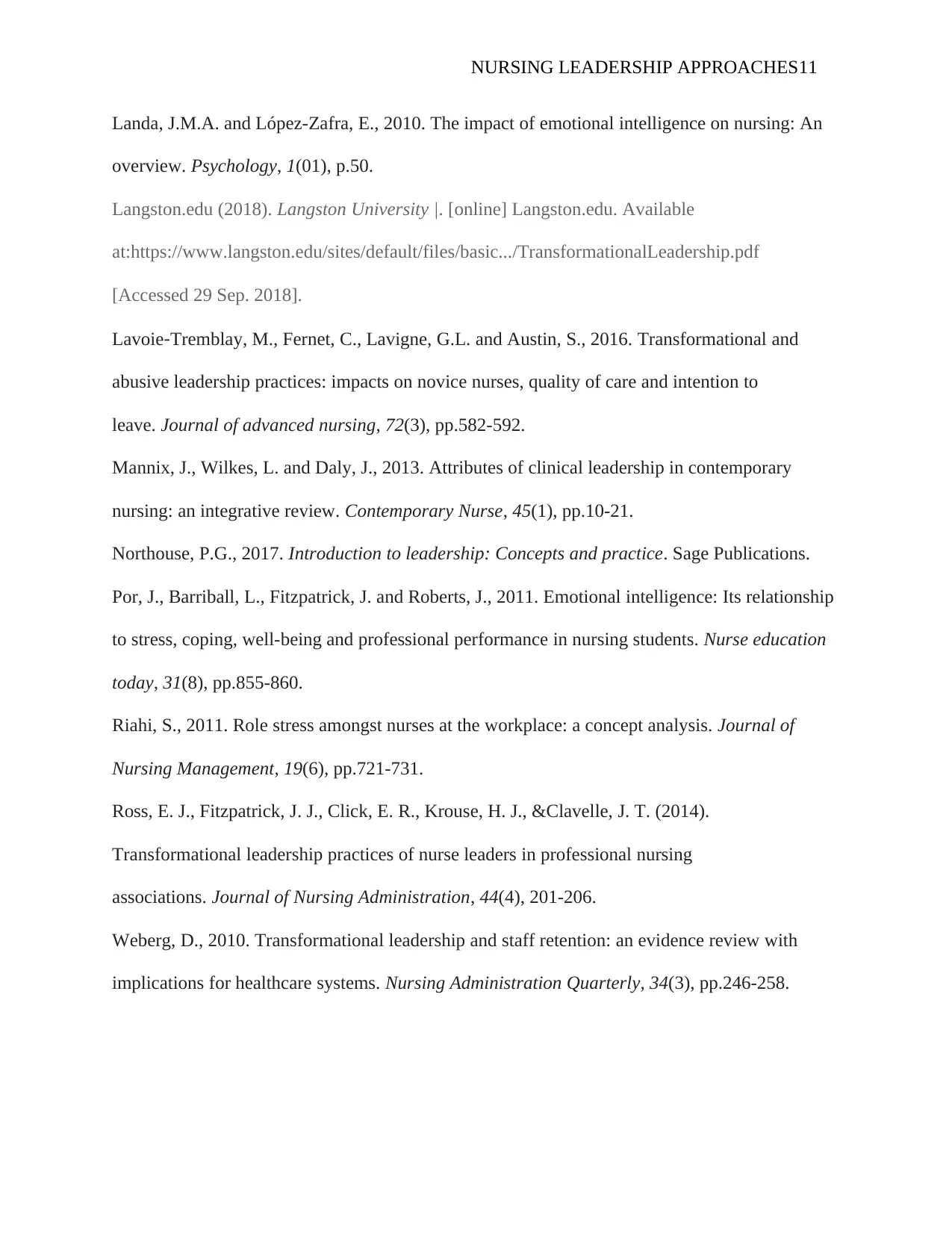
NURSING LEADERSHIP APPROACHES11
Landa, J.M.A. and López-Zafra, E., 2010. The impact of emotional intelligence on nursing: An
overview. Psychology, 1(01), p.50.
Langston.edu (2018). Langston University |. [online] Langston.edu. Available
at:https://www.langston.edu/sites/default/files/basic.../TransformationalLeadership.pdf
[Accessed 29 Sep. 2018].
Lavoie‐Tremblay, M., Fernet, C., Lavigne, G.L. and Austin, S., 2016. Transformational and
abusive leadership practices: impacts on novice nurses, quality of care and intention to
leave. Journal of advanced nursing, 72(3), pp.582-592.
Mannix, J., Wilkes, L. and Daly, J., 2013. Attributes of clinical leadership in contemporary
nursing: an integrative review. Contemporary Nurse, 45(1), pp.10-21.
Northouse, P.G., 2017. Introduction to leadership: Concepts and practice. Sage Publications.
Por, J., Barriball, L., Fitzpatrick, J. and Roberts, J., 2011. Emotional intelligence: Its relationship
to stress, coping, well-being and professional performance in nursing students. Nurse education
today, 31(8), pp.855-860.
Riahi, S., 2011. Role stress amongst nurses at the workplace: a concept analysis. Journal of
Nursing Management, 19(6), pp.721-731.
Ross, E. J., Fitzpatrick, J. J., Click, E. R., Krouse, H. J., &Clavelle, J. T. (2014).
Transformational leadership practices of nurse leaders in professional nursing
associations. Journal of Nursing Administration, 44(4), 201-206.
Weberg, D., 2010. Transformational leadership and staff retention: an evidence review with
implications for healthcare systems. Nursing Administration Quarterly, 34(3), pp.246-258.
Landa, J.M.A. and López-Zafra, E., 2010. The impact of emotional intelligence on nursing: An
overview. Psychology, 1(01), p.50.
Langston.edu (2018). Langston University |. [online] Langston.edu. Available
at:https://www.langston.edu/sites/default/files/basic.../TransformationalLeadership.pdf
[Accessed 29 Sep. 2018].
Lavoie‐Tremblay, M., Fernet, C., Lavigne, G.L. and Austin, S., 2016. Transformational and
abusive leadership practices: impacts on novice nurses, quality of care and intention to
leave. Journal of advanced nursing, 72(3), pp.582-592.
Mannix, J., Wilkes, L. and Daly, J., 2013. Attributes of clinical leadership in contemporary
nursing: an integrative review. Contemporary Nurse, 45(1), pp.10-21.
Northouse, P.G., 2017. Introduction to leadership: Concepts and practice. Sage Publications.
Por, J., Barriball, L., Fitzpatrick, J. and Roberts, J., 2011. Emotional intelligence: Its relationship
to stress, coping, well-being and professional performance in nursing students. Nurse education
today, 31(8), pp.855-860.
Riahi, S., 2011. Role stress amongst nurses at the workplace: a concept analysis. Journal of
Nursing Management, 19(6), pp.721-731.
Ross, E. J., Fitzpatrick, J. J., Click, E. R., Krouse, H. J., &Clavelle, J. T. (2014).
Transformational leadership practices of nurse leaders in professional nursing
associations. Journal of Nursing Administration, 44(4), 201-206.
Weberg, D., 2010. Transformational leadership and staff retention: an evidence review with
implications for healthcare systems. Nursing Administration Quarterly, 34(3), pp.246-258.
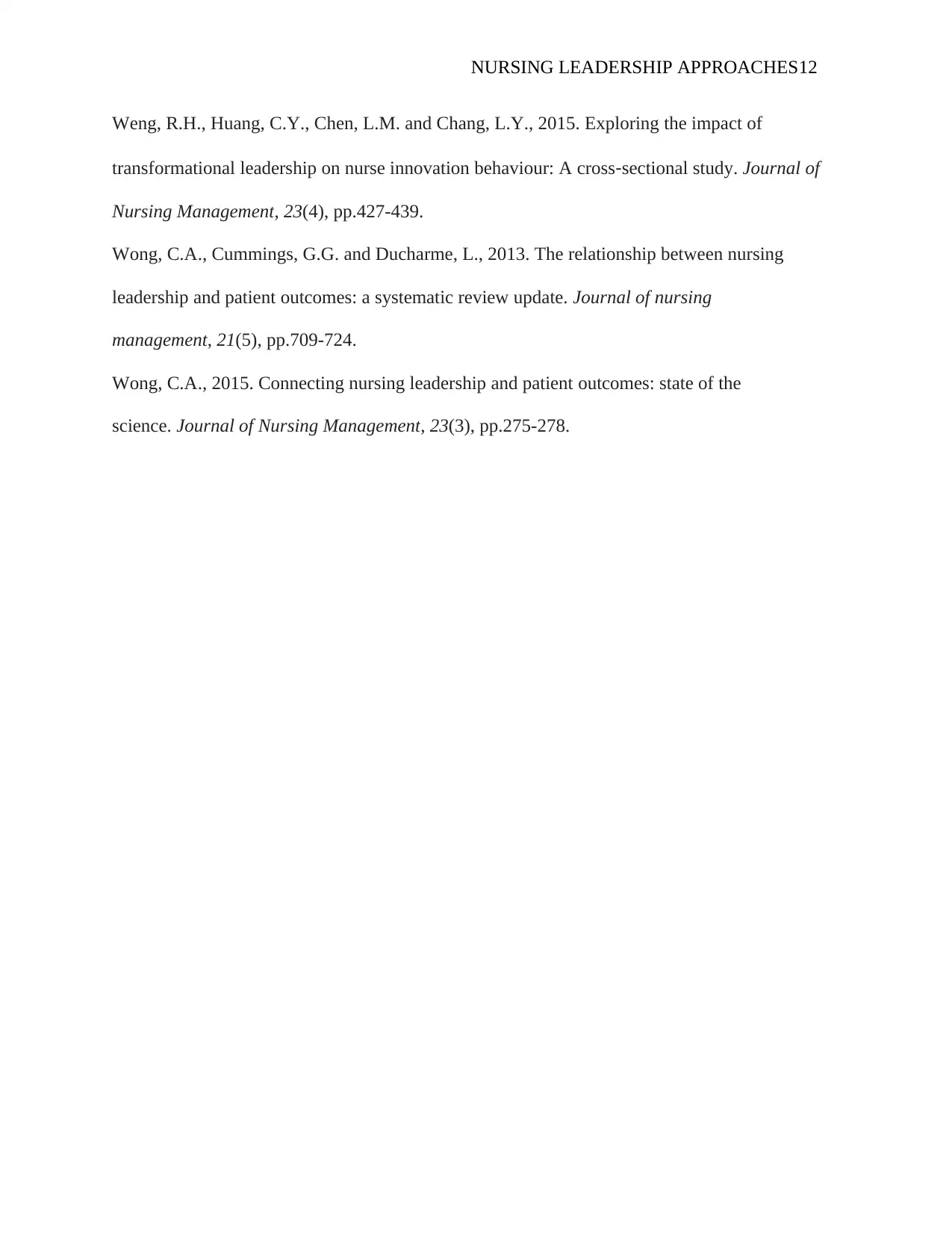
NURSING LEADERSHIP APPROACHES12
Weng, R.H., Huang, C.Y., Chen, L.M. and Chang, L.Y., 2015. Exploring the impact of
transformational leadership on nurse innovation behaviour: A cross‐sectional study. Journal of
Nursing Management, 23(4), pp.427-439.
Wong, C.A., Cummings, G.G. and Ducharme, L., 2013. The relationship between nursing
leadership and patient outcomes: a systematic review update. Journal of nursing
management, 21(5), pp.709-724.
Wong, C.A., 2015. Connecting nursing leadership and patient outcomes: state of the
science. Journal of Nursing Management, 23(3), pp.275-278.
Weng, R.H., Huang, C.Y., Chen, L.M. and Chang, L.Y., 2015. Exploring the impact of
transformational leadership on nurse innovation behaviour: A cross‐sectional study. Journal of
Nursing Management, 23(4), pp.427-439.
Wong, C.A., Cummings, G.G. and Ducharme, L., 2013. The relationship between nursing
leadership and patient outcomes: a systematic review update. Journal of nursing
management, 21(5), pp.709-724.
Wong, C.A., 2015. Connecting nursing leadership and patient outcomes: state of the
science. Journal of Nursing Management, 23(3), pp.275-278.
⊘ This is a preview!⊘
Do you want full access?
Subscribe today to unlock all pages.

Trusted by 1+ million students worldwide
1 out of 12
Related Documents
Your All-in-One AI-Powered Toolkit for Academic Success.
+13062052269
info@desklib.com
Available 24*7 on WhatsApp / Email
![[object Object]](/_next/static/media/star-bottom.7253800d.svg)
Unlock your academic potential
Copyright © 2020–2026 A2Z Services. All Rights Reserved. Developed and managed by ZUCOL.





